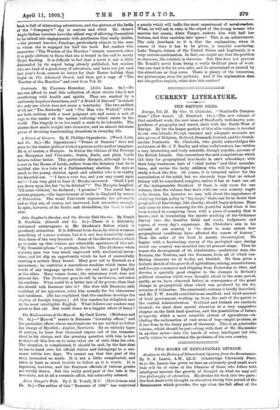C URRENT LITERAT URE•
THE BRITISH ISLES.
Europe, Vol. IL By Geo. G. Chisholm. "Stanford's Compen- dium" (New Issue). (E. Stanford. 15s.)—The new volume of that excellent work, the new issue of Stanford's well-known com- pendium of geography and travel, deals with the North-West of Europe. By far the larger portion of this able volume is devoted to our own islands, though succinct and adequate accounts are also given of Belgium, Holland, Denmark,'Iceland, and the Scandi- navian Peninsula. Mr. Chisholm, who gladly acknowledges the assistance of Mr. J. T. Bealby and other collaborators, has written a very interesting and truly scientific, though popular, amount of the British Islands. One remembers the arid compilations which did duty for geographical text-books in one's schooldays, with their long wearisome lists of "chief towns" and their manufac- tures, and envies the lucky children who will be privileged to study a book like this. Of course, it is intended rather for the consultation of the adult, but we sincerely hope that no school library will be considered complete unless it has at least one set of the indispensable Stanford. If there is only room for one volume, then the volume that deals with our own country ought to be chosen, for, however we may talk about the importance of studying foreign policy in " big maps," there can be no doubt that geographical knowledge, like charity, should begin at home. Maps only come to have a meaning for the youthful mind when it has been trained in comparing them with a piece of country that it knows, and in translating the mystic marking of the Ordnance Survey into the familiar fields and roads, hedgerows and copses, of every day's experience. Mr. Chisholm's aim in his account of our country is "to show to some extent how geographical conditions have affected the course of history." Thus the order of his book is mainly chronological. He begins with a fascinating survey of the geological ages during which our country was moulded into its present shape. Then he traces the development of its inhabitants,—prehistoric man, the Romans, the Teutons, and the Normans, from all of which con- flicting elements we of to-day are blended. He then gives a historic sketch of the growth of agriculture, mining, manufactures, and foreign commerce and shipping from Domesday to 1800; and devotes a specially good chapter to the changes in Britain's political situation which were brought about in the same period, partly, as we have observed before, in consequence of the great change in geographical ideas which was produced by the dis- coveries of Columbus. The nineteenth century is briefly described, and Mr. T. W. Arnold contributes an excellent and lucid account of local government, working up from the unit of the parish to the central Administration. Scotland and Ireland are similarly treated: we must draw special attention to a very suggestive chapter on the Irish land question, and the possibilities of future prosperity which a more scientific system of agriculture—in- cluding the reclamation of vast areas of bog—might produce, as it has done in the fenny parts of Germany. This is an admirable volume, which should be put—along with that of Mr. Mackinder in another series—into the hands of every intelligent lad who really wishes to understand the problems of his own country.






































 Previous page
Previous page